GSBS6002 - Accor Hotels: Strategy for Enhancing Customer Satisfaction
VerifiedAdded on 2023/06/09
|21
|5441
|378
Case Study
AI Summary
This case study examines the factors influencing customer satisfaction and service quality within the Accor Hotel Group in Australia, specifically focusing on Ibis and Mercure hotels, in the face of growing competition from Airbnb. The study involved an online survey of 431 Accor hotel guests, with data analyzed using descriptive statistics, correlation analysis, and ANOVA to determine the relationship between service quality attributes and customer satisfaction. The research identified a positive correlation between all six service quality attributes and customer satisfaction, highlighting the importance of service quality in driving customer loyalty. The findings are intended to assist Accor Hotel Group management in developing strategies to enhance customer satisfaction and service loyalty in a competitive market.
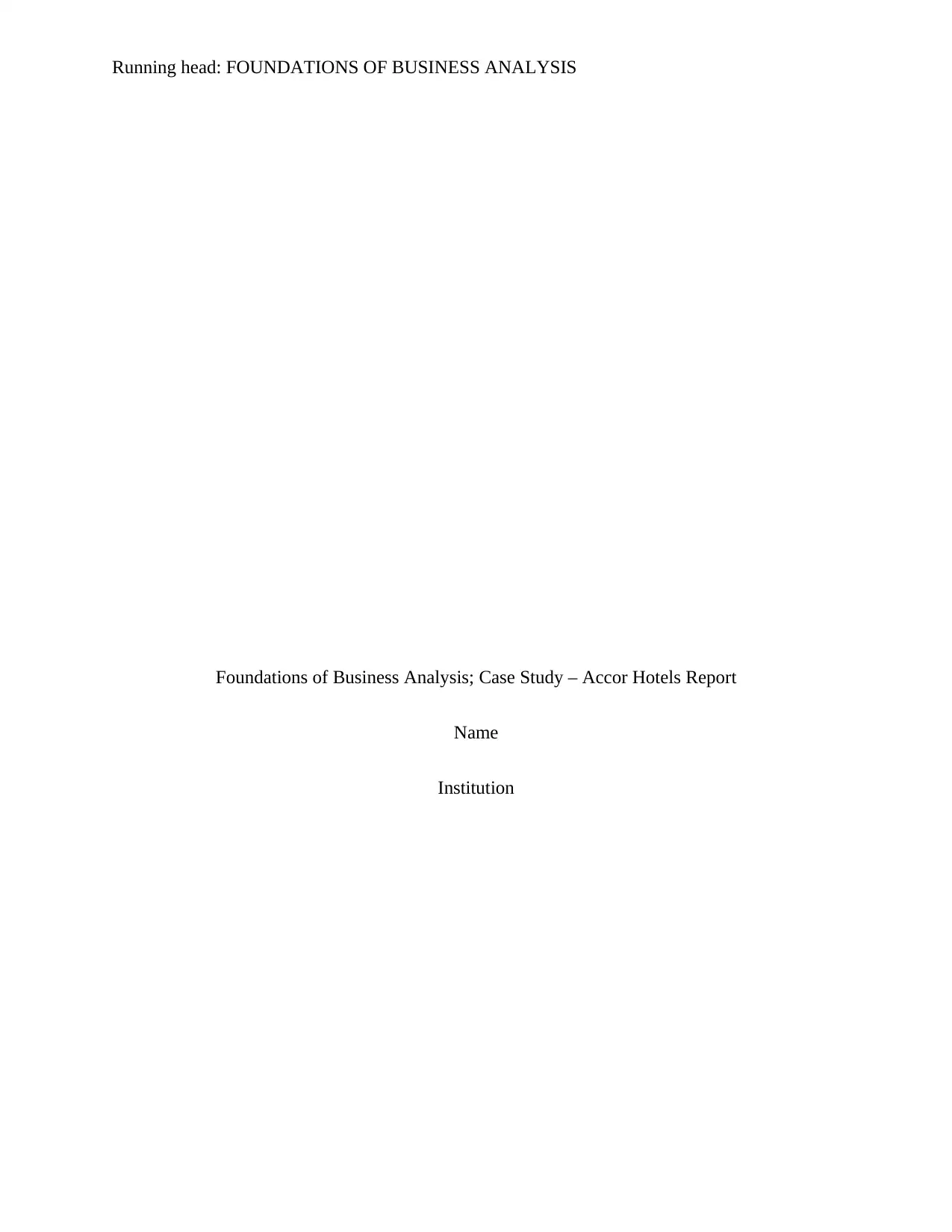
Running head: FOUNDATIONS OF BUSINESS ANALYSIS
Foundations of Business Analysis; Case Study – Accor Hotels Report
Name
Institution
Foundations of Business Analysis; Case Study – Accor Hotels Report
Name
Institution
Paraphrase This Document
Need a fresh take? Get an instant paraphrase of this document with our AI Paraphraser
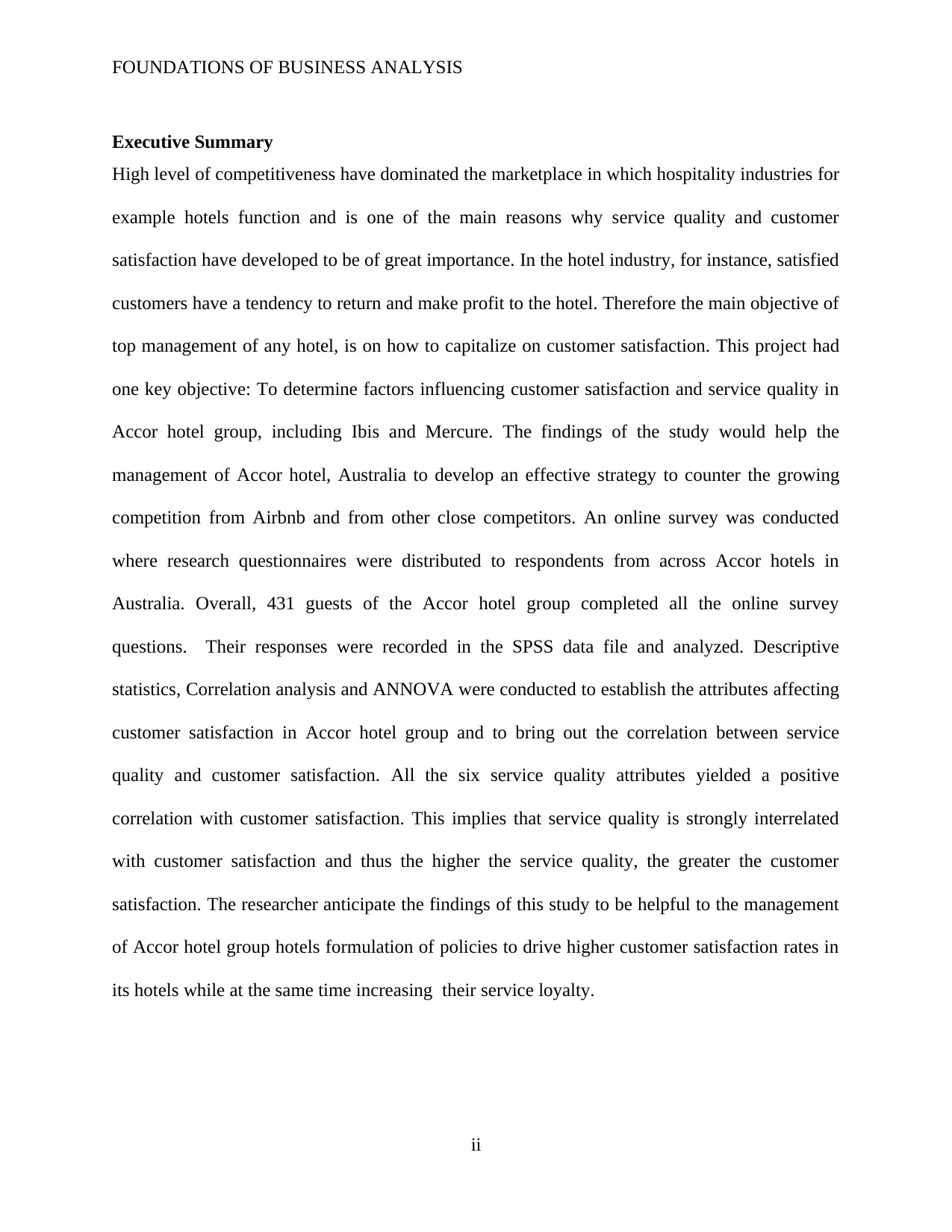
FOUNDATIONS OF BUSINESS ANALYSIS
Executive Summary
High level of competitiveness have dominated the marketplace in which hospitality industries for
example hotels function and is one of the main reasons why service quality and customer
satisfaction have developed to be of great importance. In the hotel industry, for instance, satisfied
customers have a tendency to return and make profit to the hotel. Therefore the main objective of
top management of any hotel, is on how to capitalize on customer satisfaction. This project had
one key objective: To determine factors influencing customer satisfaction and service quality in
Accor hotel group, including Ibis and Mercure. The findings of the study would help the
management of Accor hotel, Australia to develop an effective strategy to counter the growing
competition from Airbnb and from other close competitors. An online survey was conducted
where research questionnaires were distributed to respondents from across Accor hotels in
Australia. Overall, 431 guests of the Accor hotel group completed all the online survey
questions. Their responses were recorded in the SPSS data file and analyzed. Descriptive
statistics, Correlation analysis and ANNOVA were conducted to establish the attributes affecting
customer satisfaction in Accor hotel group and to bring out the correlation between service
quality and customer satisfaction. All the six service quality attributes yielded a positive
correlation with customer satisfaction. This implies that service quality is strongly interrelated
with customer satisfaction and thus the higher the service quality, the greater the customer
satisfaction. The researcher anticipate the findings of this study to be helpful to the management
of Accor hotel group hotels formulation of policies to drive higher customer satisfaction rates in
its hotels while at the same time increasing their service loyalty.
ii
Executive Summary
High level of competitiveness have dominated the marketplace in which hospitality industries for
example hotels function and is one of the main reasons why service quality and customer
satisfaction have developed to be of great importance. In the hotel industry, for instance, satisfied
customers have a tendency to return and make profit to the hotel. Therefore the main objective of
top management of any hotel, is on how to capitalize on customer satisfaction. This project had
one key objective: To determine factors influencing customer satisfaction and service quality in
Accor hotel group, including Ibis and Mercure. The findings of the study would help the
management of Accor hotel, Australia to develop an effective strategy to counter the growing
competition from Airbnb and from other close competitors. An online survey was conducted
where research questionnaires were distributed to respondents from across Accor hotels in
Australia. Overall, 431 guests of the Accor hotel group completed all the online survey
questions. Their responses were recorded in the SPSS data file and analyzed. Descriptive
statistics, Correlation analysis and ANNOVA were conducted to establish the attributes affecting
customer satisfaction in Accor hotel group and to bring out the correlation between service
quality and customer satisfaction. All the six service quality attributes yielded a positive
correlation with customer satisfaction. This implies that service quality is strongly interrelated
with customer satisfaction and thus the higher the service quality, the greater the customer
satisfaction. The researcher anticipate the findings of this study to be helpful to the management
of Accor hotel group hotels formulation of policies to drive higher customer satisfaction rates in
its hotels while at the same time increasing their service loyalty.
ii
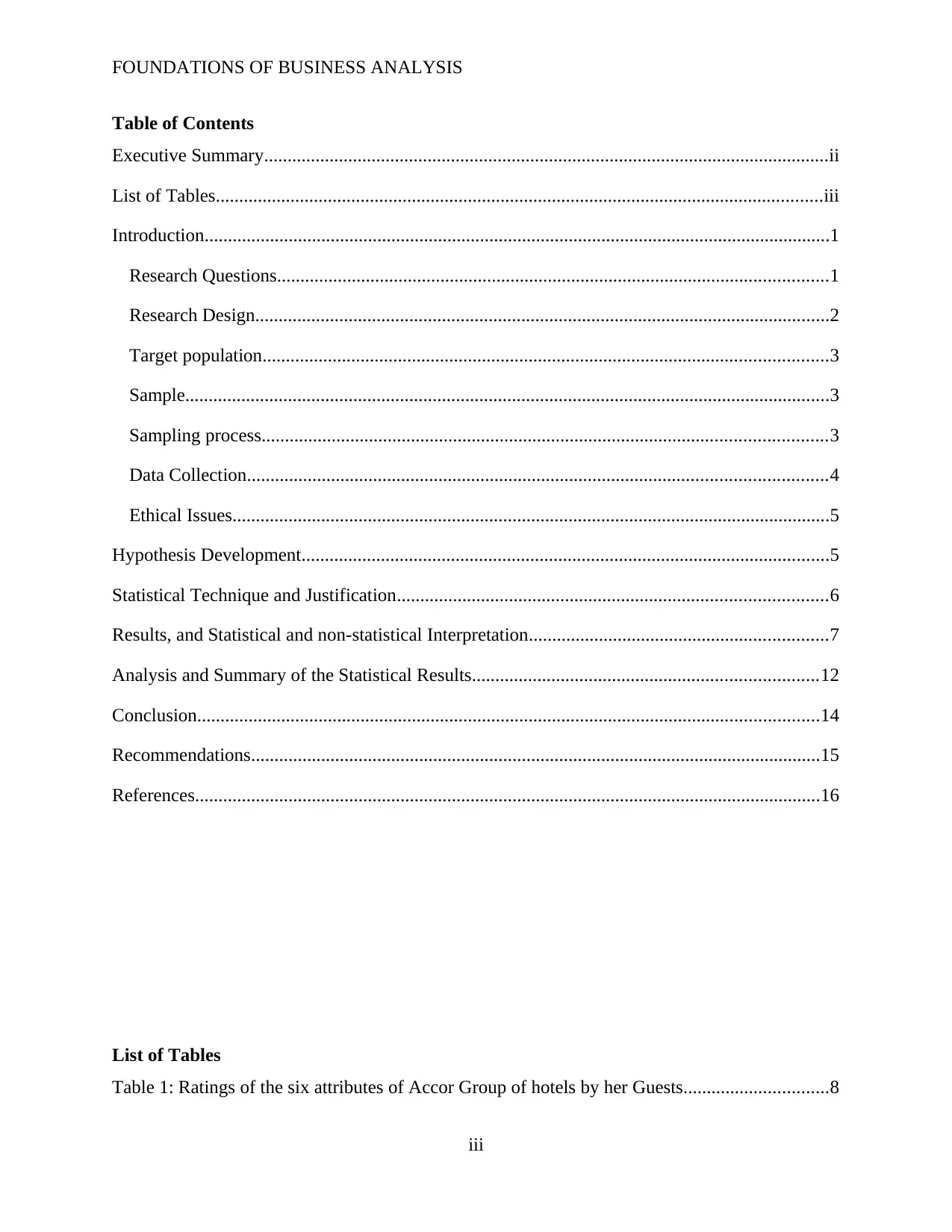
FOUNDATIONS OF BUSINESS ANALYSIS
Table of Contents
Executive Summary.........................................................................................................................ii
List of Tables..................................................................................................................................iii
Introduction......................................................................................................................................1
Research Questions......................................................................................................................1
Research Design...........................................................................................................................2
Target population.........................................................................................................................3
Sample..........................................................................................................................................3
Sampling process.........................................................................................................................3
Data Collection............................................................................................................................4
Ethical Issues................................................................................................................................5
Hypothesis Development.................................................................................................................5
Statistical Technique and Justification............................................................................................6
Results, and Statistical and non-statistical Interpretation................................................................7
Analysis and Summary of the Statistical Results..........................................................................12
Conclusion.....................................................................................................................................14
Recommendations..........................................................................................................................15
References......................................................................................................................................16
List of Tables
Table 1: Ratings of the six attributes of Accor Group of hotels by her Guests...............................8
iii
Table of Contents
Executive Summary.........................................................................................................................ii
List of Tables..................................................................................................................................iii
Introduction......................................................................................................................................1
Research Questions......................................................................................................................1
Research Design...........................................................................................................................2
Target population.........................................................................................................................3
Sample..........................................................................................................................................3
Sampling process.........................................................................................................................3
Data Collection............................................................................................................................4
Ethical Issues................................................................................................................................5
Hypothesis Development.................................................................................................................5
Statistical Technique and Justification............................................................................................6
Results, and Statistical and non-statistical Interpretation................................................................7
Analysis and Summary of the Statistical Results..........................................................................12
Conclusion.....................................................................................................................................14
Recommendations..........................................................................................................................15
References......................................................................................................................................16
List of Tables
Table 1: Ratings of the six attributes of Accor Group of hotels by her Guests...............................8
iii
⊘ This is a preview!⊘
Do you want full access?
Subscribe today to unlock all pages.

Trusted by 1+ million students worldwide
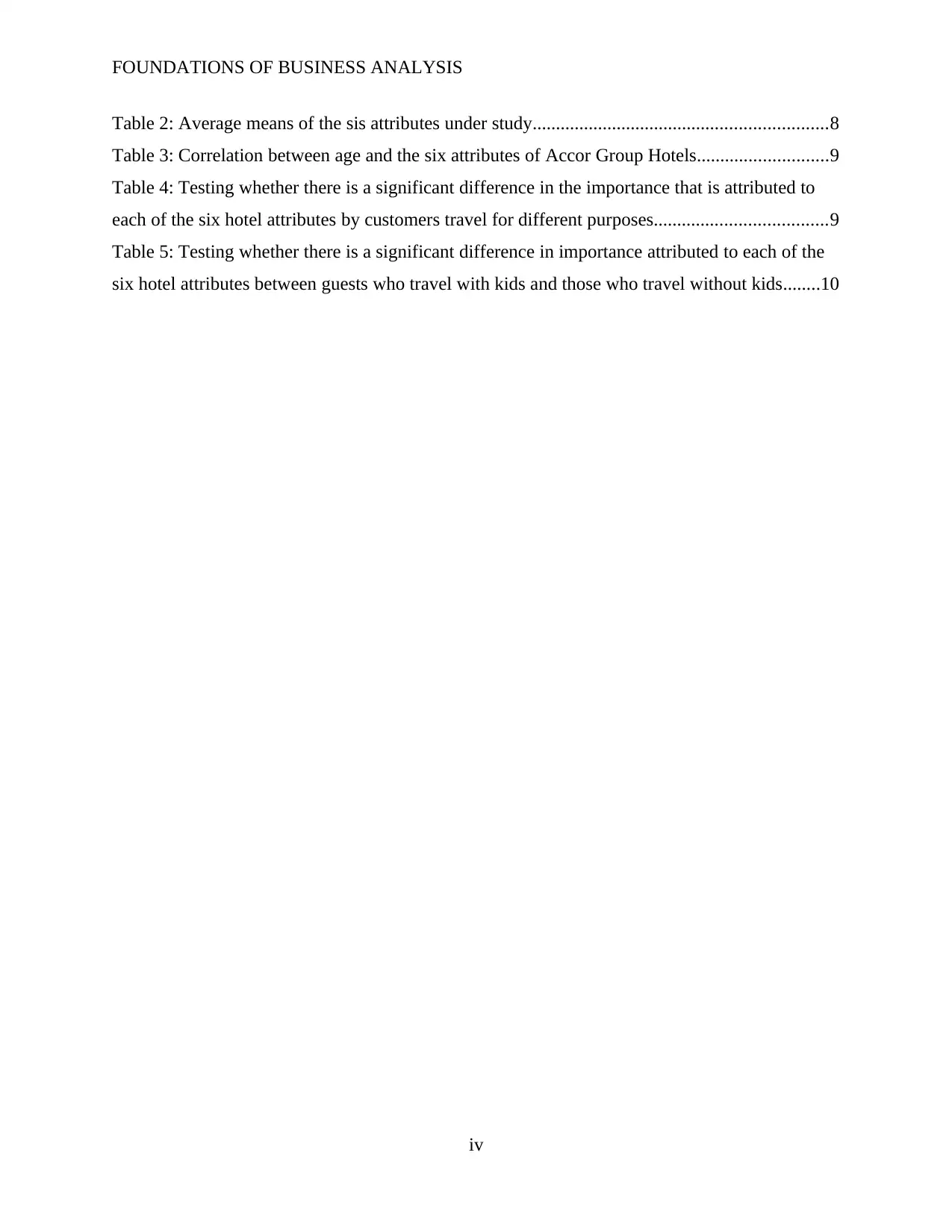
FOUNDATIONS OF BUSINESS ANALYSIS
Table 2: Average means of the sis attributes under study...............................................................8
Table 3: Correlation between age and the six attributes of Accor Group Hotels............................9
Table 4: Testing whether there is a significant difference in the importance that is attributed to
each of the six hotel attributes by customers travel for different purposes.....................................9
Table 5: Testing whether there is a significant difference in importance attributed to each of the
six hotel attributes between guests who travel with kids and those who travel without kids........10
iv
Table 2: Average means of the sis attributes under study...............................................................8
Table 3: Correlation between age and the six attributes of Accor Group Hotels............................9
Table 4: Testing whether there is a significant difference in the importance that is attributed to
each of the six hotel attributes by customers travel for different purposes.....................................9
Table 5: Testing whether there is a significant difference in importance attributed to each of the
six hotel attributes between guests who travel with kids and those who travel without kids........10
iv
Paraphrase This Document
Need a fresh take? Get an instant paraphrase of this document with our AI Paraphraser
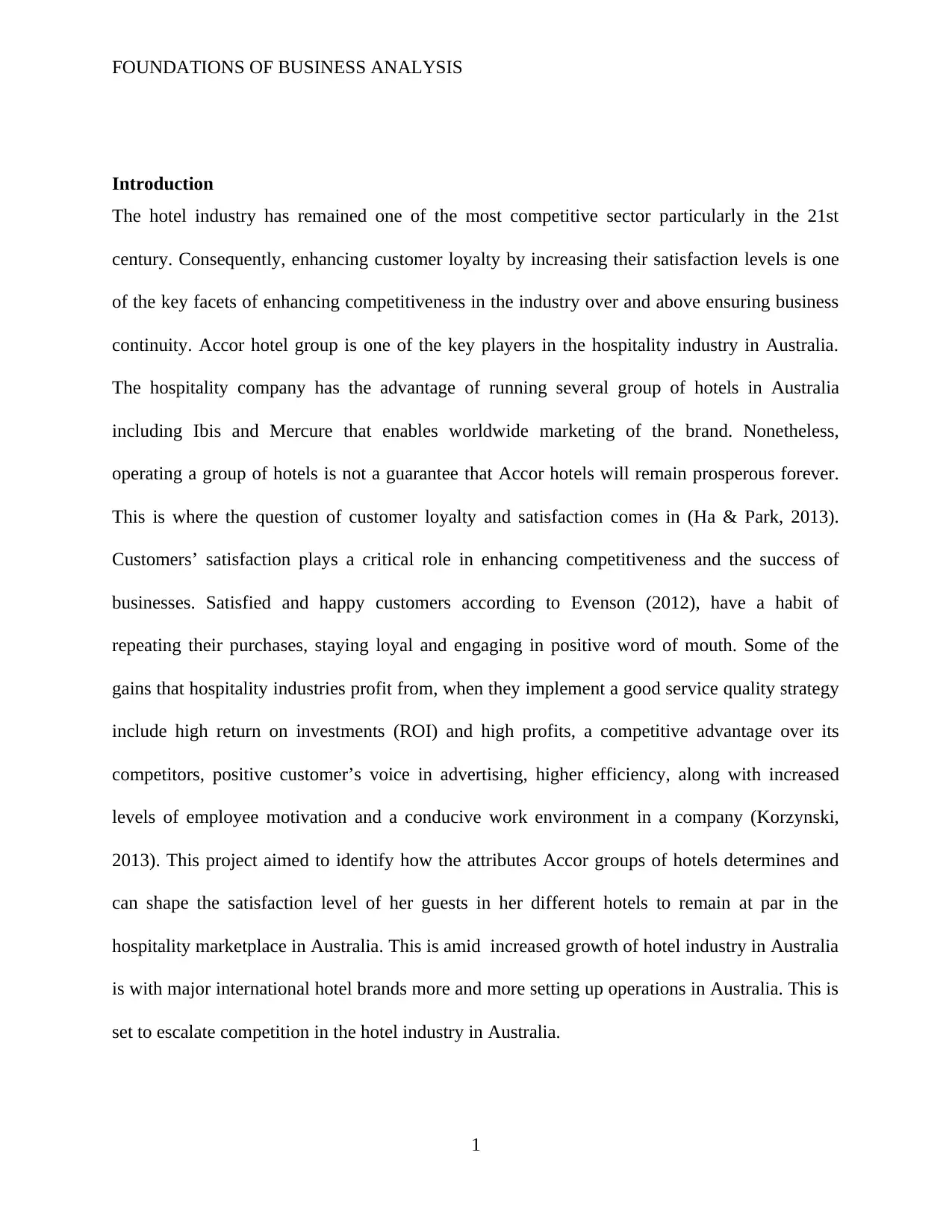
FOUNDATIONS OF BUSINESS ANALYSIS
Introduction
The hotel industry has remained one of the most competitive sector particularly in the 21st
century. Consequently, enhancing customer loyalty by increasing their satisfaction levels is one
of the key facets of enhancing competitiveness in the industry over and above ensuring business
continuity. Accor hotel group is one of the key players in the hospitality industry in Australia.
The hospitality company has the advantage of running several group of hotels in Australia
including Ibis and Mercure that enables worldwide marketing of the brand. Nonetheless,
operating a group of hotels is not a guarantee that Accor hotels will remain prosperous forever.
This is where the question of customer loyalty and satisfaction comes in (Ha & Park, 2013).
Customers’ satisfaction plays a critical role in enhancing competitiveness and the success of
businesses. Satisfied and happy customers according to Evenson (2012), have a habit of
repeating their purchases, staying loyal and engaging in positive word of mouth. Some of the
gains that hospitality industries profit from, when they implement a good service quality strategy
include high return on investments (ROI) and high profits, a competitive advantage over its
competitors, positive customer’s voice in advertising, higher efficiency, along with increased
levels of employee motivation and a conducive work environment in a company (Korzynski,
2013). This project aimed to identify how the attributes Accor groups of hotels determines and
can shape the satisfaction level of her guests in her different hotels to remain at par in the
hospitality marketplace in Australia. This is amid increased growth of hotel industry in Australia
is with major international hotel brands more and more setting up operations in Australia. This is
set to escalate competition in the hotel industry in Australia.
1
Introduction
The hotel industry has remained one of the most competitive sector particularly in the 21st
century. Consequently, enhancing customer loyalty by increasing their satisfaction levels is one
of the key facets of enhancing competitiveness in the industry over and above ensuring business
continuity. Accor hotel group is one of the key players in the hospitality industry in Australia.
The hospitality company has the advantage of running several group of hotels in Australia
including Ibis and Mercure that enables worldwide marketing of the brand. Nonetheless,
operating a group of hotels is not a guarantee that Accor hotels will remain prosperous forever.
This is where the question of customer loyalty and satisfaction comes in (Ha & Park, 2013).
Customers’ satisfaction plays a critical role in enhancing competitiveness and the success of
businesses. Satisfied and happy customers according to Evenson (2012), have a habit of
repeating their purchases, staying loyal and engaging in positive word of mouth. Some of the
gains that hospitality industries profit from, when they implement a good service quality strategy
include high return on investments (ROI) and high profits, a competitive advantage over its
competitors, positive customer’s voice in advertising, higher efficiency, along with increased
levels of employee motivation and a conducive work environment in a company (Korzynski,
2013). This project aimed to identify how the attributes Accor groups of hotels determines and
can shape the satisfaction level of her guests in her different hotels to remain at par in the
hospitality marketplace in Australia. This is amid increased growth of hotel industry in Australia
is with major international hotel brands more and more setting up operations in Australia. This is
set to escalate competition in the hotel industry in Australia.
1
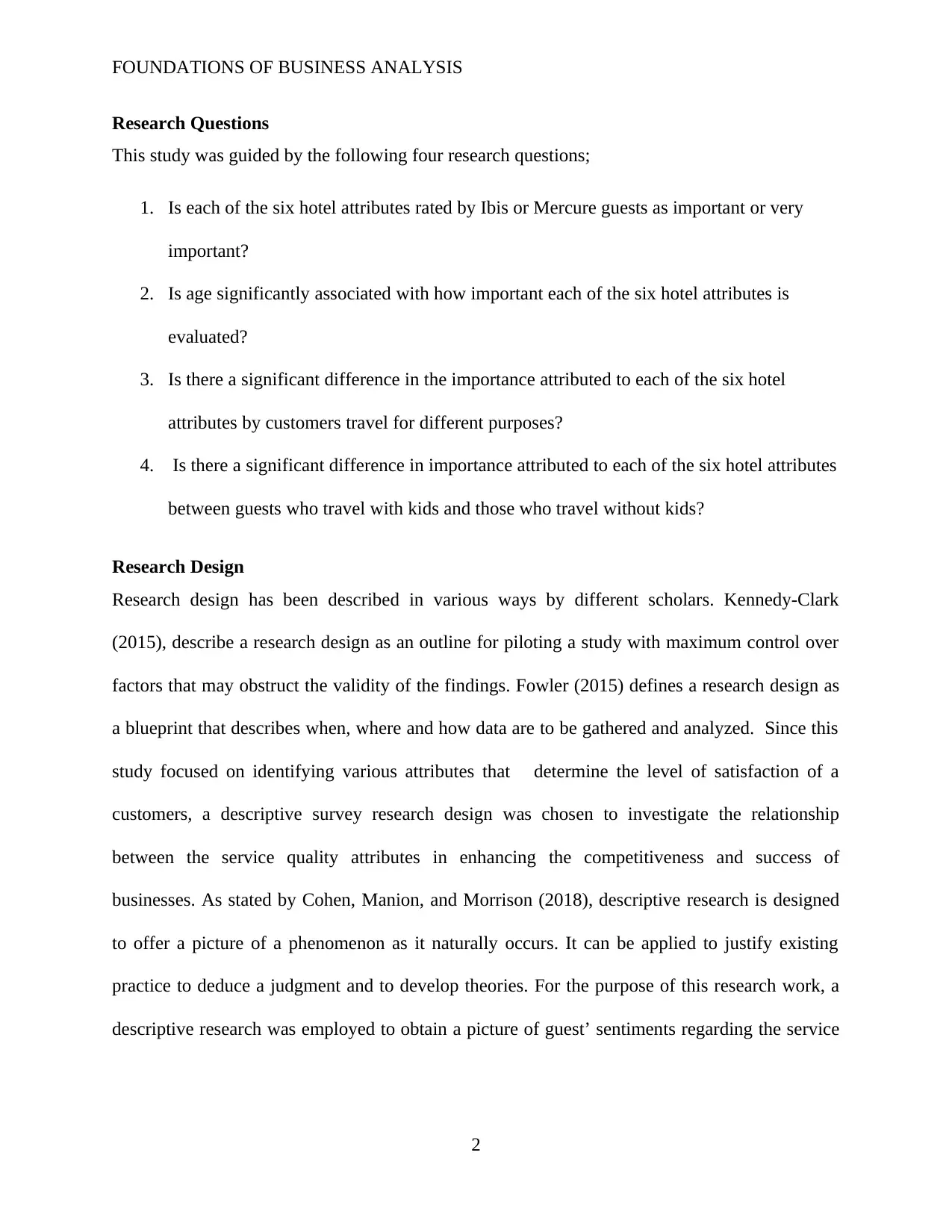
FOUNDATIONS OF BUSINESS ANALYSIS
Research Questions
This study was guided by the following four research questions;
1. Is each of the six hotel attributes rated by Ibis or Mercure guests as important or very
important?
2. Is age significantly associated with how important each of the six hotel attributes is
evaluated?
3. Is there a significant difference in the importance attributed to each of the six hotel
attributes by customers travel for different purposes?
4. Is there a significant difference in importance attributed to each of the six hotel attributes
between guests who travel with kids and those who travel without kids?
Research Design
Research design has been described in various ways by different scholars. Kennedy-Clark
(2015), describe a research design as an outline for piloting a study with maximum control over
factors that may obstruct the validity of the findings. Fowler (2015) defines a research design as
a blueprint that describes when, where and how data are to be gathered and analyzed. Since this
study focused on identifying various attributes that determine the level of satisfaction of a
customers, a descriptive survey research design was chosen to investigate the relationship
between the service quality attributes in enhancing the competitiveness and success of
businesses. As stated by Cohen, Manion, and Morrison (2018), descriptive research is designed
to offer a picture of a phenomenon as it naturally occurs. It can be applied to justify existing
practice to deduce a judgment and to develop theories. For the purpose of this research work, a
descriptive research was employed to obtain a picture of guest’ sentiments regarding the service
2
Research Questions
This study was guided by the following four research questions;
1. Is each of the six hotel attributes rated by Ibis or Mercure guests as important or very
important?
2. Is age significantly associated with how important each of the six hotel attributes is
evaluated?
3. Is there a significant difference in the importance attributed to each of the six hotel
attributes by customers travel for different purposes?
4. Is there a significant difference in importance attributed to each of the six hotel attributes
between guests who travel with kids and those who travel without kids?
Research Design
Research design has been described in various ways by different scholars. Kennedy-Clark
(2015), describe a research design as an outline for piloting a study with maximum control over
factors that may obstruct the validity of the findings. Fowler (2015) defines a research design as
a blueprint that describes when, where and how data are to be gathered and analyzed. Since this
study focused on identifying various attributes that determine the level of satisfaction of a
customers, a descriptive survey research design was chosen to investigate the relationship
between the service quality attributes in enhancing the competitiveness and success of
businesses. As stated by Cohen, Manion, and Morrison (2018), descriptive research is designed
to offer a picture of a phenomenon as it naturally occurs. It can be applied to justify existing
practice to deduce a judgment and to develop theories. For the purpose of this research work, a
descriptive research was employed to obtain a picture of guest’ sentiments regarding the service
2
⊘ This is a preview!⊘
Do you want full access?
Subscribe today to unlock all pages.

Trusted by 1+ million students worldwide
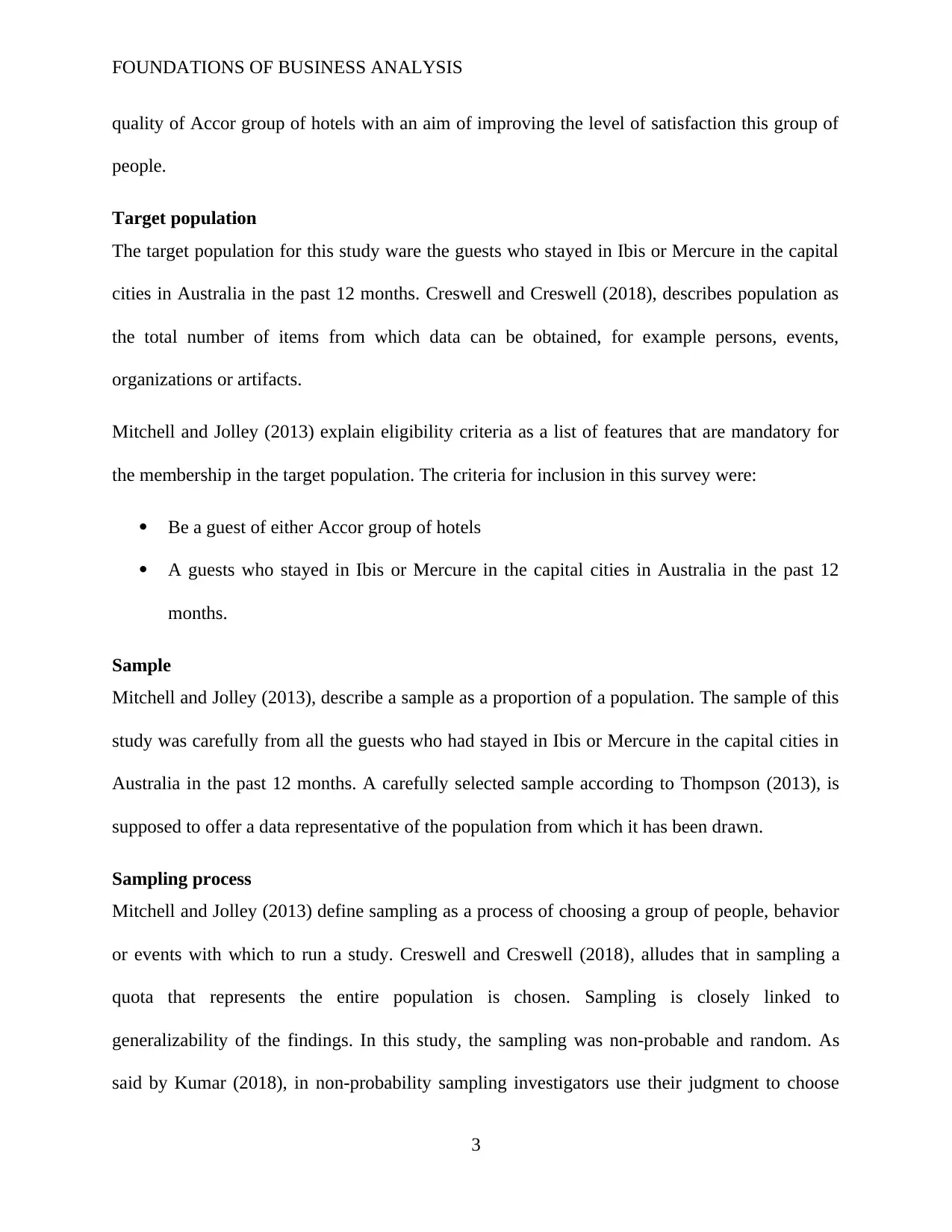
FOUNDATIONS OF BUSINESS ANALYSIS
quality of Accor group of hotels with an aim of improving the level of satisfaction this group of
people.
Target population
The target population for this study ware the guests who stayed in Ibis or Mercure in the capital
cities in Australia in the past 12 months. Creswell and Creswell (2018), describes population as
the total number of items from which data can be obtained, for example persons, events,
organizations or artifacts.
Mitchell and Jolley (2013) explain eligibility criteria as a list of features that are mandatory for
the membership in the target population. The criteria for inclusion in this survey were:
Be a guest of either Accor group of hotels
A guests who stayed in Ibis or Mercure in the capital cities in Australia in the past 12
months.
Sample
Mitchell and Jolley (2013), describe a sample as a proportion of a population. The sample of this
study was carefully from all the guests who had stayed in Ibis or Mercure in the capital cities in
Australia in the past 12 months. A carefully selected sample according to Thompson (2013), is
supposed to offer a data representative of the population from which it has been drawn.
Sampling process
Mitchell and Jolley (2013) define sampling as a process of choosing a group of people, behavior
or events with which to run a study. Creswell and Creswell (2018), alludes that in sampling a
quota that represents the entire population is chosen. Sampling is closely linked to
generalizability of the findings. In this study, the sampling was non-probable and random. As
said by Kumar (2018), in non-probability sampling investigators use their judgment to choose
3
quality of Accor group of hotels with an aim of improving the level of satisfaction this group of
people.
Target population
The target population for this study ware the guests who stayed in Ibis or Mercure in the capital
cities in Australia in the past 12 months. Creswell and Creswell (2018), describes population as
the total number of items from which data can be obtained, for example persons, events,
organizations or artifacts.
Mitchell and Jolley (2013) explain eligibility criteria as a list of features that are mandatory for
the membership in the target population. The criteria for inclusion in this survey were:
Be a guest of either Accor group of hotels
A guests who stayed in Ibis or Mercure in the capital cities in Australia in the past 12
months.
Sample
Mitchell and Jolley (2013), describe a sample as a proportion of a population. The sample of this
study was carefully from all the guests who had stayed in Ibis or Mercure in the capital cities in
Australia in the past 12 months. A carefully selected sample according to Thompson (2013), is
supposed to offer a data representative of the population from which it has been drawn.
Sampling process
Mitchell and Jolley (2013) define sampling as a process of choosing a group of people, behavior
or events with which to run a study. Creswell and Creswell (2018), alludes that in sampling a
quota that represents the entire population is chosen. Sampling is closely linked to
generalizability of the findings. In this study, the sampling was non-probable and random. As
said by Kumar (2018), in non-probability sampling investigators use their judgment to choose
3
Paraphrase This Document
Need a fresh take? Get an instant paraphrase of this document with our AI Paraphraser
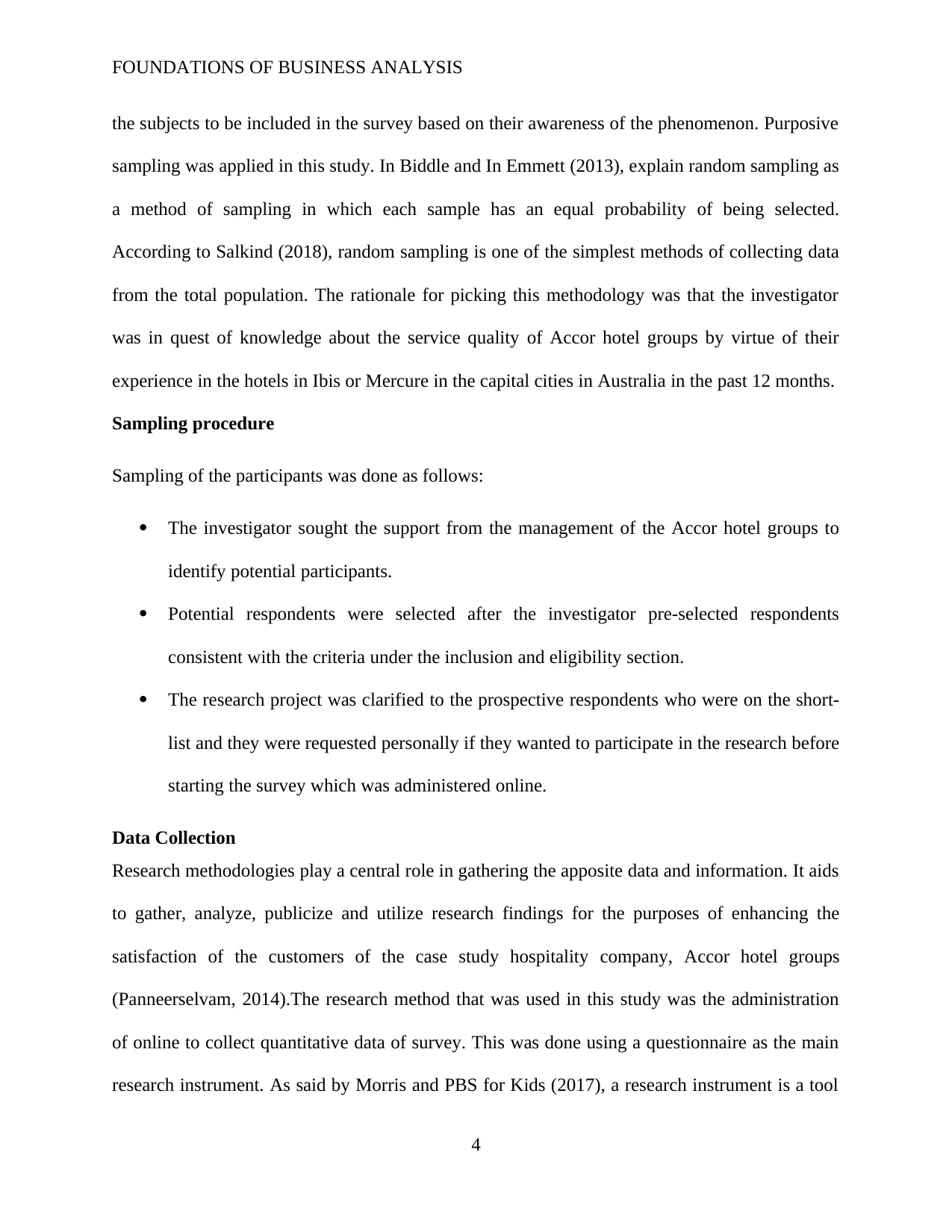
FOUNDATIONS OF BUSINESS ANALYSIS
the subjects to be included in the survey based on their awareness of the phenomenon. Purposive
sampling was applied in this study. In Biddle and In Emmett (2013), explain random sampling as
a method of sampling in which each sample has an equal probability of being selected.
According to Salkind (2018), random sampling is one of the simplest methods of collecting data
from the total population. The rationale for picking this methodology was that the investigator
was in quest of knowledge about the service quality of Accor hotel groups by virtue of their
experience in the hotels in Ibis or Mercure in the capital cities in Australia in the past 12 months.
Sampling procedure
Sampling of the participants was done as follows:
The investigator sought the support from the management of the Accor hotel groups to
identify potential participants.
Potential respondents were selected after the investigator pre-selected respondents
consistent with the criteria under the inclusion and eligibility section.
The research project was clarified to the prospective respondents who were on the short-
list and they were requested personally if they wanted to participate in the research before
starting the survey which was administered online.
Data Collection
Research methodologies play a central role in gathering the apposite data and information. It aids
to gather, analyze, publicize and utilize research findings for the purposes of enhancing the
satisfaction of the customers of the case study hospitality company, Accor hotel groups
(Panneerselvam, 2014).The research method that was used in this study was the administration
of online to collect quantitative data of survey. This was done using a questionnaire as the main
research instrument. As said by Morris and PBS for Kids (2017), a research instrument is a tool
4
the subjects to be included in the survey based on their awareness of the phenomenon. Purposive
sampling was applied in this study. In Biddle and In Emmett (2013), explain random sampling as
a method of sampling in which each sample has an equal probability of being selected.
According to Salkind (2018), random sampling is one of the simplest methods of collecting data
from the total population. The rationale for picking this methodology was that the investigator
was in quest of knowledge about the service quality of Accor hotel groups by virtue of their
experience in the hotels in Ibis or Mercure in the capital cities in Australia in the past 12 months.
Sampling procedure
Sampling of the participants was done as follows:
The investigator sought the support from the management of the Accor hotel groups to
identify potential participants.
Potential respondents were selected after the investigator pre-selected respondents
consistent with the criteria under the inclusion and eligibility section.
The research project was clarified to the prospective respondents who were on the short-
list and they were requested personally if they wanted to participate in the research before
starting the survey which was administered online.
Data Collection
Research methodologies play a central role in gathering the apposite data and information. It aids
to gather, analyze, publicize and utilize research findings for the purposes of enhancing the
satisfaction of the customers of the case study hospitality company, Accor hotel groups
(Panneerselvam, 2014).The research method that was used in this study was the administration
of online to collect quantitative data of survey. This was done using a questionnaire as the main
research instrument. As said by Morris and PBS for Kids (2017), a research instrument is a tool
4
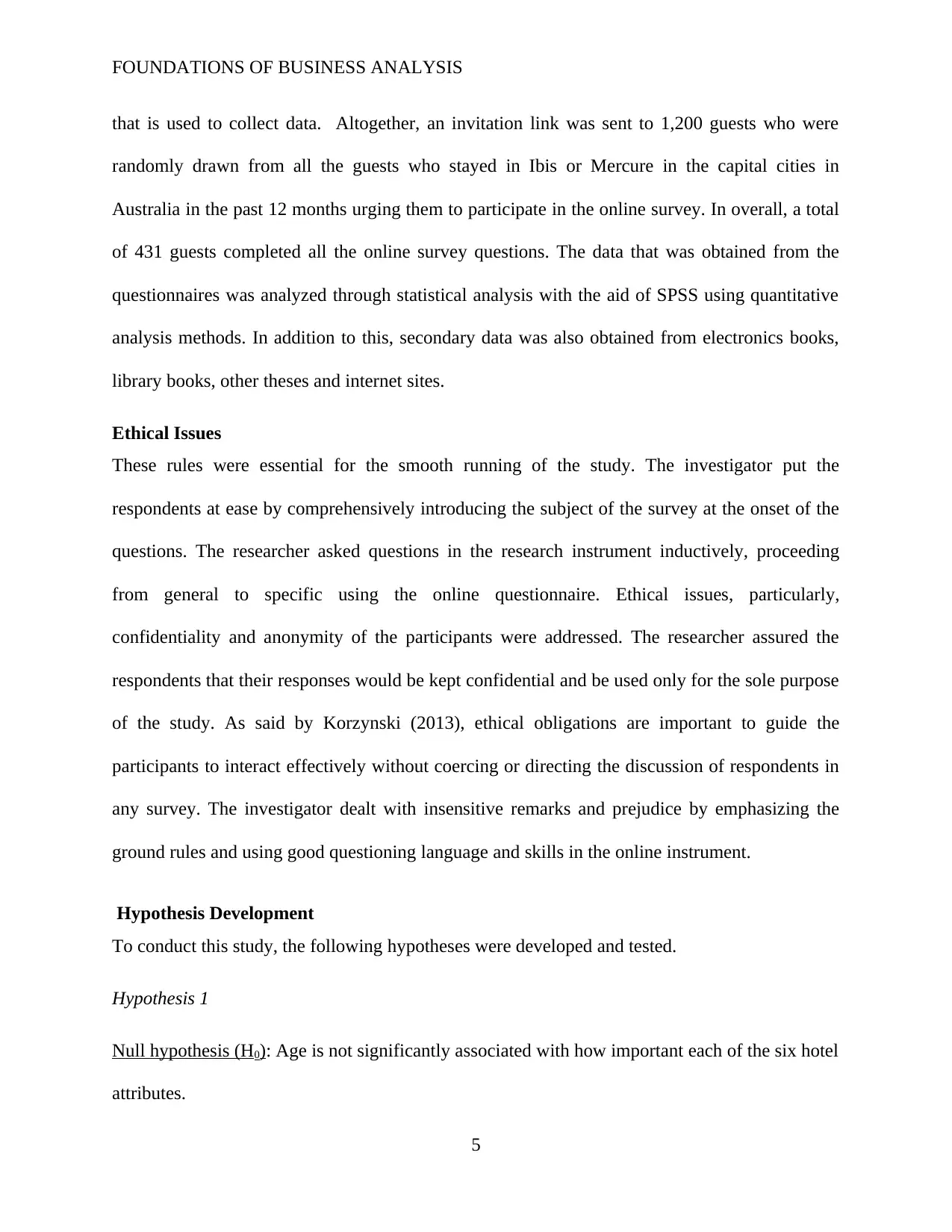
FOUNDATIONS OF BUSINESS ANALYSIS
that is used to collect data. Altogether, an invitation link was sent to 1,200 guests who were
randomly drawn from all the guests who stayed in Ibis or Mercure in the capital cities in
Australia in the past 12 months urging them to participate in the online survey. In overall, a total
of 431 guests completed all the online survey questions. The data that was obtained from the
questionnaires was analyzed through statistical analysis with the aid of SPSS using quantitative
analysis methods. In addition to this, secondary data was also obtained from electronics books,
library books, other theses and internet sites.
Ethical Issues
These rules were essential for the smooth running of the study. The investigator put the
respondents at ease by comprehensively introducing the subject of the survey at the onset of the
questions. The researcher asked questions in the research instrument inductively, proceeding
from general to specific using the online questionnaire. Ethical issues, particularly,
confidentiality and anonymity of the participants were addressed. The researcher assured the
respondents that their responses would be kept confidential and be used only for the sole purpose
of the study. As said by Korzynski (2013), ethical obligations are important to guide the
participants to interact effectively without coercing or directing the discussion of respondents in
any survey. The investigator dealt with insensitive remarks and prejudice by emphasizing the
ground rules and using good questioning language and skills in the online instrument.
Hypothesis Development
To conduct this study, the following hypotheses were developed and tested.
Hypothesis 1
Null hypothesis (H0): Age is not significantly associated with how important each of the six hotel
attributes.
5
that is used to collect data. Altogether, an invitation link was sent to 1,200 guests who were
randomly drawn from all the guests who stayed in Ibis or Mercure in the capital cities in
Australia in the past 12 months urging them to participate in the online survey. In overall, a total
of 431 guests completed all the online survey questions. The data that was obtained from the
questionnaires was analyzed through statistical analysis with the aid of SPSS using quantitative
analysis methods. In addition to this, secondary data was also obtained from electronics books,
library books, other theses and internet sites.
Ethical Issues
These rules were essential for the smooth running of the study. The investigator put the
respondents at ease by comprehensively introducing the subject of the survey at the onset of the
questions. The researcher asked questions in the research instrument inductively, proceeding
from general to specific using the online questionnaire. Ethical issues, particularly,
confidentiality and anonymity of the participants were addressed. The researcher assured the
respondents that their responses would be kept confidential and be used only for the sole purpose
of the study. As said by Korzynski (2013), ethical obligations are important to guide the
participants to interact effectively without coercing or directing the discussion of respondents in
any survey. The investigator dealt with insensitive remarks and prejudice by emphasizing the
ground rules and using good questioning language and skills in the online instrument.
Hypothesis Development
To conduct this study, the following hypotheses were developed and tested.
Hypothesis 1
Null hypothesis (H0): Age is not significantly associated with how important each of the six hotel
attributes.
5
⊘ This is a preview!⊘
Do you want full access?
Subscribe today to unlock all pages.

Trusted by 1+ million students worldwide
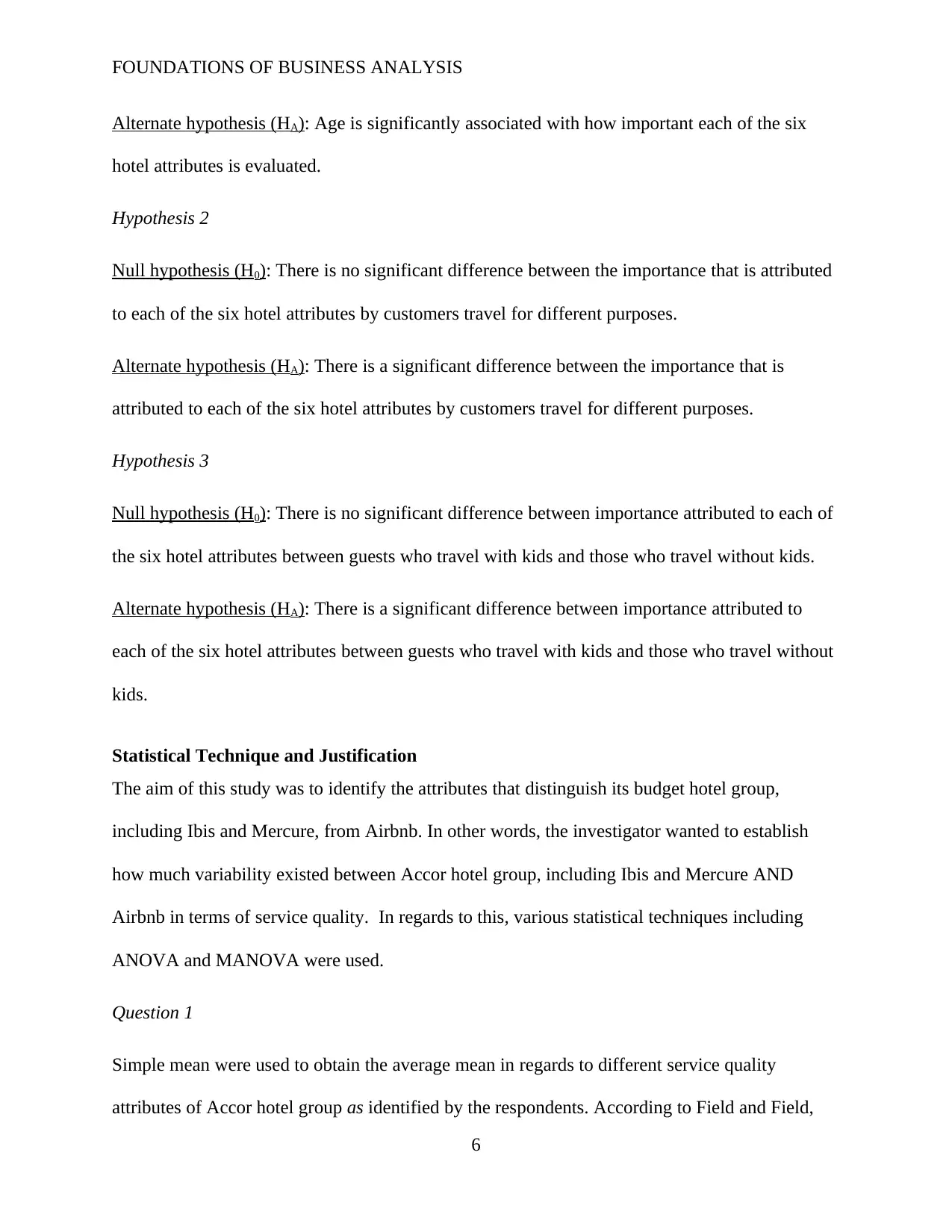
FOUNDATIONS OF BUSINESS ANALYSIS
Alternate hypothesis (HA): Age is significantly associated with how important each of the six
hotel attributes is evaluated.
Hypothesis 2
Null hypothesis (H0): There is no significant difference between the importance that is attributed
to each of the six hotel attributes by customers travel for different purposes.
Alternate hypothesis (HA): There is a significant difference between the importance that is
attributed to each of the six hotel attributes by customers travel for different purposes.
Hypothesis 3
Null hypothesis (H0): There is no significant difference between importance attributed to each of
the six hotel attributes between guests who travel with kids and those who travel without kids.
Alternate hypothesis (HA): There is a significant difference between importance attributed to
each of the six hotel attributes between guests who travel with kids and those who travel without
kids.
Statistical Technique and Justification
The aim of this study was to identify the attributes that distinguish its budget hotel group,
including Ibis and Mercure, from Airbnb. In other words, the investigator wanted to establish
how much variability existed between Accor hotel group, including Ibis and Mercure AND
Airbnb in terms of service quality. In regards to this, various statistical techniques including
ANOVA and MANOVA were used.
Question 1
Simple mean were used to obtain the average mean in regards to different service quality
attributes of Accor hotel group as identified by the respondents. According to Field and Field,
6
Alternate hypothesis (HA): Age is significantly associated with how important each of the six
hotel attributes is evaluated.
Hypothesis 2
Null hypothesis (H0): There is no significant difference between the importance that is attributed
to each of the six hotel attributes by customers travel for different purposes.
Alternate hypothesis (HA): There is a significant difference between the importance that is
attributed to each of the six hotel attributes by customers travel for different purposes.
Hypothesis 3
Null hypothesis (H0): There is no significant difference between importance attributed to each of
the six hotel attributes between guests who travel with kids and those who travel without kids.
Alternate hypothesis (HA): There is a significant difference between importance attributed to
each of the six hotel attributes between guests who travel with kids and those who travel without
kids.
Statistical Technique and Justification
The aim of this study was to identify the attributes that distinguish its budget hotel group,
including Ibis and Mercure, from Airbnb. In other words, the investigator wanted to establish
how much variability existed between Accor hotel group, including Ibis and Mercure AND
Airbnb in terms of service quality. In regards to this, various statistical techniques including
ANOVA and MANOVA were used.
Question 1
Simple mean were used to obtain the average mean in regards to different service quality
attributes of Accor hotel group as identified by the respondents. According to Field and Field,
6
Paraphrase This Document
Need a fresh take? Get an instant paraphrase of this document with our AI Paraphraser
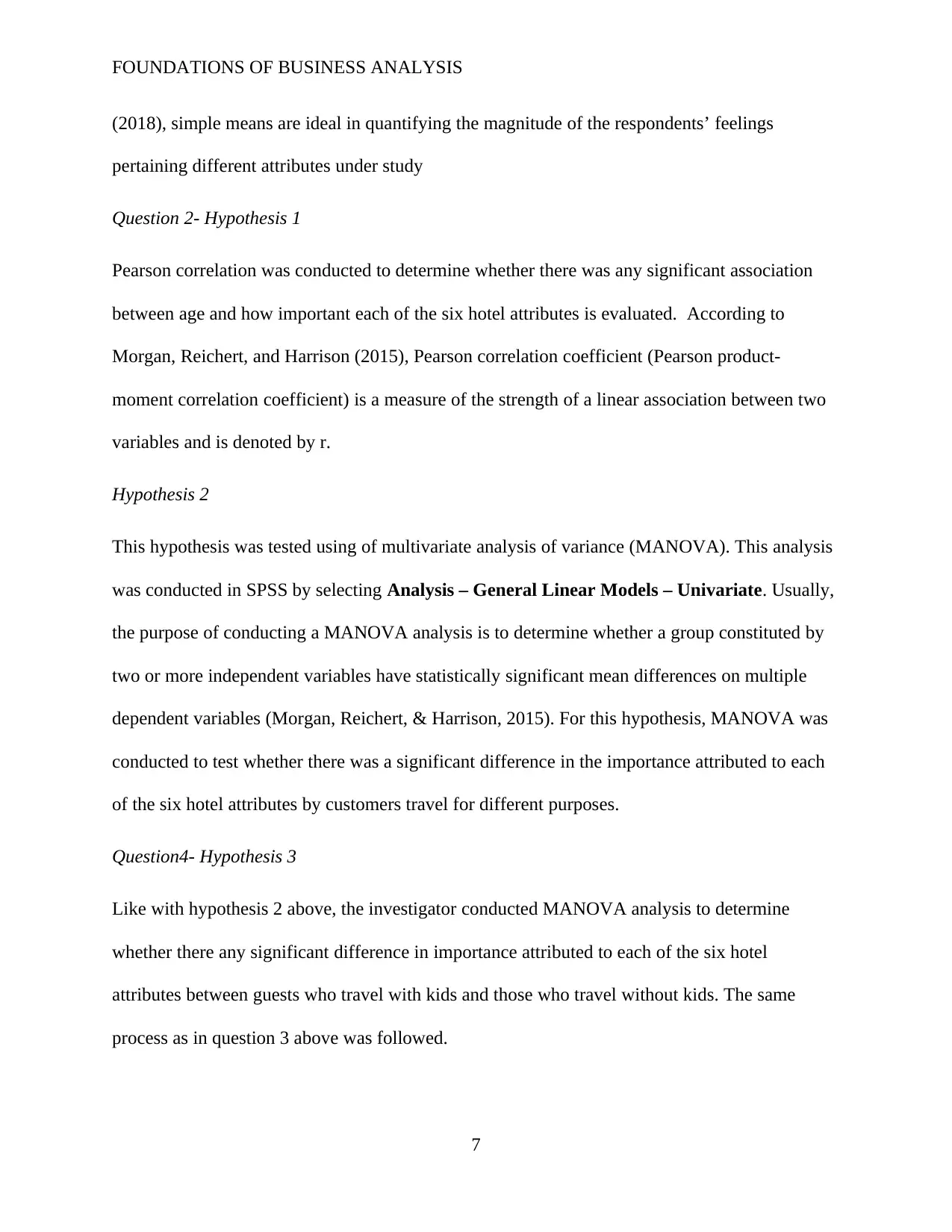
FOUNDATIONS OF BUSINESS ANALYSIS
(2018), simple means are ideal in quantifying the magnitude of the respondents’ feelings
pertaining different attributes under study
Question 2- Hypothesis 1
Pearson correlation was conducted to determine whether there was any significant association
between age and how important each of the six hotel attributes is evaluated. According to
Morgan, Reichert, and Harrison (2015), Pearson correlation coefficient (Pearson product-
moment correlation coefficient) is a measure of the strength of a linear association between two
variables and is denoted by r.
Hypothesis 2
This hypothesis was tested using of multivariate analysis of variance (MANOVA). This analysis
was conducted in SPSS by selecting Analysis – General Linear Models – Univariate. Usually,
the purpose of conducting a MANOVA analysis is to determine whether a group constituted by
two or more independent variables have statistically significant mean differences on multiple
dependent variables (Morgan, Reichert, & Harrison, 2015). For this hypothesis, MANOVA was
conducted to test whether there was a significant difference in the importance attributed to each
of the six hotel attributes by customers travel for different purposes.
Question4- Hypothesis 3
Like with hypothesis 2 above, the investigator conducted MANOVA analysis to determine
whether there any significant difference in importance attributed to each of the six hotel
attributes between guests who travel with kids and those who travel without kids. The same
process as in question 3 above was followed.
7
(2018), simple means are ideal in quantifying the magnitude of the respondents’ feelings
pertaining different attributes under study
Question 2- Hypothesis 1
Pearson correlation was conducted to determine whether there was any significant association
between age and how important each of the six hotel attributes is evaluated. According to
Morgan, Reichert, and Harrison (2015), Pearson correlation coefficient (Pearson product-
moment correlation coefficient) is a measure of the strength of a linear association between two
variables and is denoted by r.
Hypothesis 2
This hypothesis was tested using of multivariate analysis of variance (MANOVA). This analysis
was conducted in SPSS by selecting Analysis – General Linear Models – Univariate. Usually,
the purpose of conducting a MANOVA analysis is to determine whether a group constituted by
two or more independent variables have statistically significant mean differences on multiple
dependent variables (Morgan, Reichert, & Harrison, 2015). For this hypothesis, MANOVA was
conducted to test whether there was a significant difference in the importance attributed to each
of the six hotel attributes by customers travel for different purposes.
Question4- Hypothesis 3
Like with hypothesis 2 above, the investigator conducted MANOVA analysis to determine
whether there any significant difference in importance attributed to each of the six hotel
attributes between guests who travel with kids and those who travel without kids. The same
process as in question 3 above was followed.
7
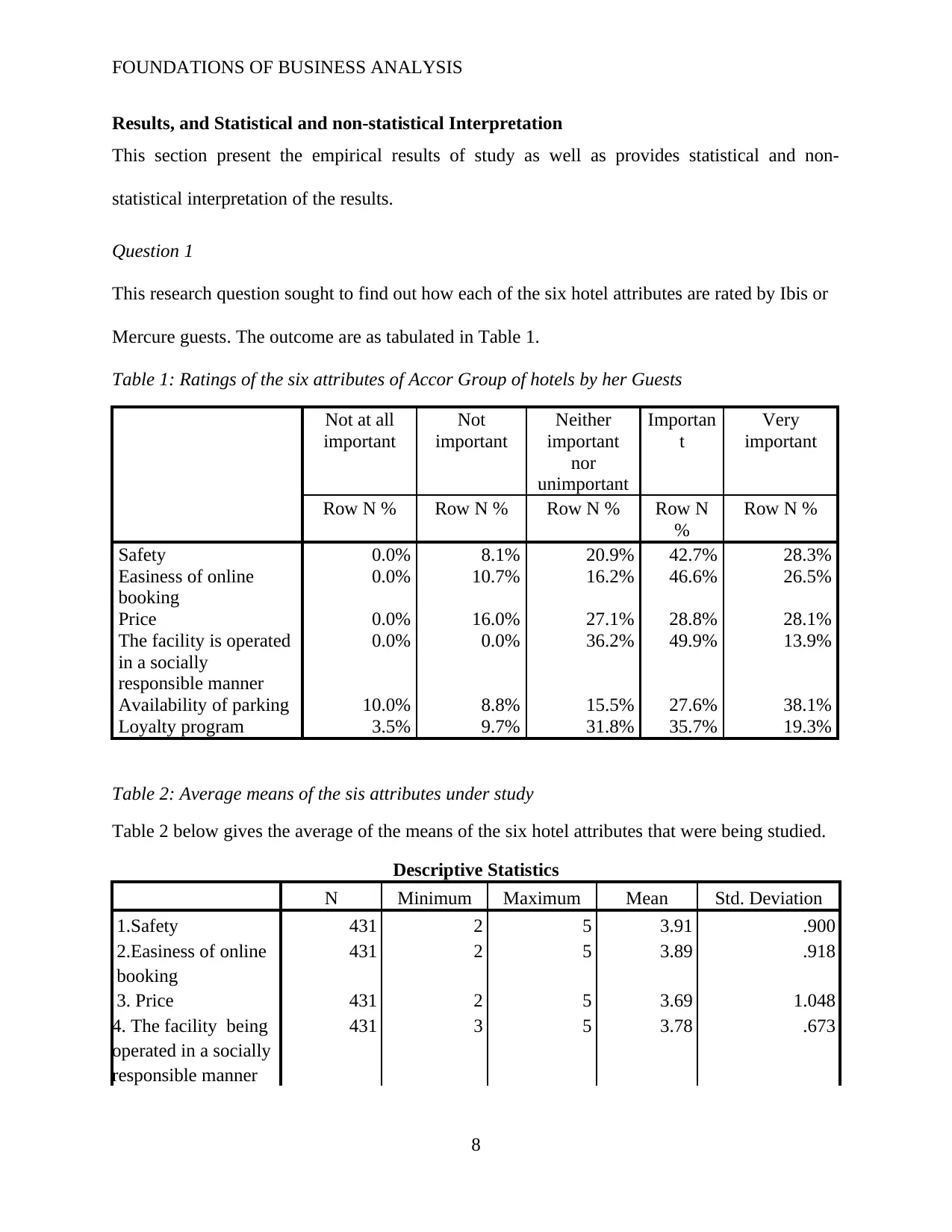
FOUNDATIONS OF BUSINESS ANALYSIS
Results, and Statistical and non-statistical Interpretation
This section present the empirical results of study as well as provides statistical and non-
statistical interpretation of the results.
Question 1
This research question sought to find out how each of the six hotel attributes are rated by Ibis or
Mercure guests. The outcome are as tabulated in Table 1.
Table 1: Ratings of the six attributes of Accor Group of hotels by her Guests
Not at all
important
Not
important
Neither
important
nor
unimportant
Importan
t
Very
important
Row N % Row N % Row N % Row N
%
Row N %
Safety 0.0% 8.1% 20.9% 42.7% 28.3%
Easiness of online
booking
0.0% 10.7% 16.2% 46.6% 26.5%
Price 0.0% 16.0% 27.1% 28.8% 28.1%
The facility is operated
in a socially
responsible manner
0.0% 0.0% 36.2% 49.9% 13.9%
Availability of parking 10.0% 8.8% 15.5% 27.6% 38.1%
Loyalty program 3.5% 9.7% 31.8% 35.7% 19.3%
Table 2: Average means of the sis attributes under study
Table 2 below gives the average of the means of the six hotel attributes that were being studied.
Descriptive Statistics
N Minimum Maximum Mean Std. Deviation
1.Safety 431 2 5 3.91 .900
2.Easiness of online
booking
431 2 5 3.89 .918
3. Price 431 2 5 3.69 1.048
4. The facility being
operated in a socially
responsible manner
431 3 5 3.78 .673
8
Results, and Statistical and non-statistical Interpretation
This section present the empirical results of study as well as provides statistical and non-
statistical interpretation of the results.
Question 1
This research question sought to find out how each of the six hotel attributes are rated by Ibis or
Mercure guests. The outcome are as tabulated in Table 1.
Table 1: Ratings of the six attributes of Accor Group of hotels by her Guests
Not at all
important
Not
important
Neither
important
nor
unimportant
Importan
t
Very
important
Row N % Row N % Row N % Row N
%
Row N %
Safety 0.0% 8.1% 20.9% 42.7% 28.3%
Easiness of online
booking
0.0% 10.7% 16.2% 46.6% 26.5%
Price 0.0% 16.0% 27.1% 28.8% 28.1%
The facility is operated
in a socially
responsible manner
0.0% 0.0% 36.2% 49.9% 13.9%
Availability of parking 10.0% 8.8% 15.5% 27.6% 38.1%
Loyalty program 3.5% 9.7% 31.8% 35.7% 19.3%
Table 2: Average means of the sis attributes under study
Table 2 below gives the average of the means of the six hotel attributes that were being studied.
Descriptive Statistics
N Minimum Maximum Mean Std. Deviation
1.Safety 431 2 5 3.91 .900
2.Easiness of online
booking
431 2 5 3.89 .918
3. Price 431 2 5 3.69 1.048
4. The facility being
operated in a socially
responsible manner
431 3 5 3.78 .673
8
⊘ This is a preview!⊘
Do you want full access?
Subscribe today to unlock all pages.

Trusted by 1+ million students worldwide
1 out of 21
Related Documents
Your All-in-One AI-Powered Toolkit for Academic Success.
+13062052269
info@desklib.com
Available 24*7 on WhatsApp / Email
![[object Object]](/_next/static/media/star-bottom.7253800d.svg)
Unlock your academic potential
Copyright © 2020–2026 A2Z Services. All Rights Reserved. Developed and managed by ZUCOL.




